News Alert–City Schedules Vote to Encourage Developers to Build Bigger Buildings
News Alert--City Schedules Vote to Encourage Developers to Build Bigger Buildings
Density-Related Traffic Congestion Not on City Agenda
Is City Hall Favoring Developers Over Its Own Citizens?
Is City Hall Favoring Developers Over Its Own Citizens?
Denning-Area Neighbors Question City Priorities
| City Residents Speak Out
One evening in early April, residents of Winter Park’s Westside showed up in force at City Hall. In a strong showing of neighborhood solidarity, Westsiders attended the April 8 Planning and Zoning (P & Z) meeting to oppose another attempt by developer Dan Bellows to change the character of their neighborhood. The neighborhood’s forceful response was triggered by a request from Bellows to modify City regulations to transform a group of single family residential lots into a high-density, high-priced residential development. Denning Area Neighborhoods On Edge as Fear of Encroachment Spreads Winter Park residents in other neighborhoods near Denning Drive are also becoming concerned about the impact of area development on their neighborhoods. Mary Randall, who lives on Kentucky Avenue near the proposed baseball stadium — just off Denning Drive — urged the city to reconsider its stance on area development:
City Too Cozy with Developers? Westside residents have long decried what they see as a too-cozy alliance between the City and developers — an alliance that is transforming their historic family neighborhood into a target-rich development zone for profit-seekers. Two of the highest-profile proposals recently considered by the City are the Lee Road Cut-Through on one end of Denning and the Rollins/Manatees Baseball Stadium on the other. Wealthy backers of the Stadium project are working with the City to tap taxpayer dollars that are earmarked for redevelopment of the Westside. There is strong support inside City Hall for the Stadium and the Cut-Through. Residents: Enough! Westside residents and those from nearby neighborhoods have recently begun to organize resistance to projects like the Cut-Through and the Baseball Stadium. Recent hearings and community meetings have been roiled by strong protests by citizen groups. Westsiders, who have, for years, lived with the threat – and the consequences – of City-enabled development, are leading the way for other neighborhoods who feel that new and proposed development may gridlock their city streets, crowd the skyline with towering buildings and permanently degrade their quality of life. Has City Abandoned Its Community Plan for Affordable Neighborhoods? In 1999, A Westside Community Plan entitled “A Report by the Westside Neighborhood Housing Task Force, 1998-1999” outlined what the community wanted to see in the 21st century. One of the goals stated in the report is “To increase the desirability and variety of residential housing opportunities for Westside residents by rehabilitating existing, viable dwellings, refining the city’s Affordable Housing Program and by attracting market-rate residential development that would be appealing to moderate-income families. The needs of current residents, including elders, shall be a priority.” (page 8 “Moving into 2000: Westside Community Plan). Fourteen years into this century, some of the goals have been achieved, but the vision to preserve affordable single family homes may be fading. With the nation’s economy now emerging from a period of stagnation, developers’ requests to transform this neighborhood are now high on the agendas of the Planning and Zoning Board and City Commission. Low-Density, Low-Traffic Community Plan Undermined by Developer Interest in More Profitable Higher-Density “Products” Rather than regarding this section of Winter Park as preserved for affordable housing, some developers see the neighborhood and adjacent areas as a prime location for upscale development “products” that would appeal to a new wealthier clientele who want to live close to downtown Winter Park. Unicorp, the developer of the new “Lakeside” retail center at Morse and 17-92, also has indicated interest in building a mixed-use (commercial/residential) project between Denning and 17-92 on the site of the Mt. Vernon Motel. Casto Properties, developer of Winter Park Village, is completing construction of a multi-story (200+) luxury apartment complex (including parking garage) on Denning next to the Village — and is reportedly eyeing the VoTech property on Denning next to the proposed Lee Rd. Cut-Through. Bellows Moves to Revise the Comp Plan
If Bellows’ request is granted, the allowed density would increase from 8 free-standing single family homes to something between 20 and 32 attached units. Although the exact number of units has gone back and forth during discussion, if the project is approved, the end result would significantly change the character of that part of the Westside. (Click video image above for Part 1 of P&Z hearing. Click video images below for Parts 2 & 3) Bellows’ Sydgan Corp. has requested this provision be amended to read, “unless such development is abutting (“abutting” shall include property separated by a right-of-way or alley) or within 100 feet of a parking garage or commercial building.” Bellows built a parking garage on the adjacent property in 2007. The Atlantic Housing Senior Living Facility — a commercial rental property — also sits on the bordering property. Comprehensive Plan Policy 1-4.1.H-3 reads: “This policy is a part of Planning Area H: Hannibal Square Neighborhood. Restrictions on Multi-family Development. The City shall strongly discourage Comprehensive Plan Amendments from Low-Density to Medium-Density or High-Density Residential Future Land Use Map designations.” Rather Than Deny Bellows’ Request, City Staff Recommends High-Density Compromise When Director of Planning Administration Dori Stone explained these requests to the P&Z Board, she reported that the staff had recommended a compromise. City staff thought building a single family home next to a parking garage would be “a hard sell,” so they recommended the property adjacent to the garage be rezoned to R-3 rather than R-4, and that a “step-down” approach in height requirements be allowed — three-story buildings “in the shadow of the garage,” but stepping down to two-story R-2 zoning along Canton and maintaining the R-1 zoning along Capen. In this scenario, density would change from 8 single family homes to 20 townhomes (P&Z video part 1 – 6:00). Bellows Claims Garage Justifies Comp Plan Revisions — Westside Residents Disagree
Linda Walker Chapell strongly criticized the City for considering Bellows’ request saying “The staff recommended that this property . . . be allowed to have a zoning change because of the garage . . . We didn’t want that garage . . . We told [ the City ] that we didn’t want it.” Bob Cambric, a former Westside resident who earned a Master’s Degree in Urban & Regional Planning and has 25 years’ experience in the field, spoke on behalf of his hometown neighbors. He argued the City should not alter its Comprehensive Plan in this piecemeal fashion. He said, “Winter Park is one of the best planned communities of the 472 cities in the state of Florida. You have a plan that has gotten you there.” Cambric explained that the policies in place are there to protect the Hannibal Square Community, but if the proposed changes are approved, the City must abandon those policies. (P&Z video part 2 – 00:00) A source close to the development community told the Voice that developers have interest in building multi-story town houses on Canton all the way from Denning to Park Ave. Developer’s Westside Story: We Want to Build $500,000 Townhomes
Although Kramer did not show any elevations or images of the proposed “product”, he explained that feedback they have received from realtors is that high-density attached townhomes would appeal to empty nesters who would like to live near the Winter Park Village and the downtown area. They have planned accordingly for a series of 2,000- to 2,500- square-foot town homes, each with a two-car garage, in the price range of $400,000 to $600,000 (and up). (P&Z video part 1 – 41:11). P&Z Tells Bellows & Westsiders to Resolve Differences
A special meeting between Dan Bellows’ Sydgan Corp. and Westside residents was held on April 24 at the Winter Park Community Center. Westside residents attended — along with Dori Stone and Jeff Briggs from the City. Mr. Bellows, however, did not attend. Instead, he sent his lawyer and the representative from David Weekley Homes to represent him. His representatives did not have the drawings of the proposed townhomes Bellows promised. Bellows’ failure to appear and his failure to produce the promised drawings angered Westside attendees. Bellows Submits a New Plan At a subsequent April 29 P&Z Board work session, Ms. Stone reported that Bellows had submitted a new set of plans. She made it clear, however, that in light of the community’s strong opposition to any departure from R-1 zoning, she doubted that Mr. Bellows’ new plan would mitigate Westsiders’ fear of the impact it will have on their neighborhood. Requested Comp Plan Revision Could Spell Trouble for Rest of Winter Park If Bellows’ request is granted, revisions to the Comprehensive Plan would be permissible wherever a parking garage is built. For instance, if a parking garage were added to the YMCA facility on Lakemont, the Comp Plan changes requested by Bellows could be used to justify the building of high-density townhomes on the properties adjoining the YMCA along Palmer and Lakemont. If a minor league baseball stadium is approved for Harper-Shepherd Field on Denning, City officials are planning to fund a parking garage as part of the stadium project. Mr. Bellows’ requested Comp Plan changes could open the door to developer interest in building similar high-profit, high-density housing “products” near a new stadium garage – a scenario envisioned by Urban Planner, Bob Cambric. During his testimony at the April 8 P&Z hearing, Mr. Cambric asked: “Who else’s neighborhoods are going to be in jeopardy because they happen to have a parking garage nearby?” “Which side are you going to be on?” Another Westside resident asked P&Z board members: “When is it going to stop?” As she named streets in Winter Park’s wealthier neighborhoods, she asked board members to consider how they’d feel if multi-family projects were built in their neighborhoods. She then appealed to the board to communicate citizen concerns to the City Commission, concluding: “We all live in Winter Park . . . It’s not a matter of the Haves or the Have-Nots. I ask which side are you going to be on?” |
Cut-Thru Update: City Votes Yes Despite Strong Citizen Opposition
Cut-Thru Update: City Votes Yes Despite Strong Citizen Opposition
Plea for More Study Rejected
| Story Update
Prior to the vote, the Commissioners debated the relative merits of the not-so-comprehensive batch of traffic studies being used to justify pushing a major traffic artery closer to the heart of Winter Park. Commissioner Cooper urged her fellow Commissioners to delay the vote in favor of more study and citizen input. She also expressed concern about the impact of increased cut-through traffic on the city’s neighborhoods.
In his explanation of the rationale for the cut-through, Public Works Director Troy Attaway asserted his belief that the cut-through will not significantly increase traffic, citing studies that traffic on the new extension will be comprised mainly of drivers who are currently accessing Webster from the eastbound turn lane on 17-92. However, Attaway acknowledged that traffic studies submitted to the City have not included projections and modeling of significant traffic that will be generated by large developments being built/planned within a few blocks of the proposed cut-through. Commission Chamber Filled with Citizens Opposing Cut-Thru
Some speakers proposed alternatives of the sort Commissioner Cooper wanted to study, including a proposal by P&Z’s Randall Slocum (speaking as a private citizen) to simply close the problematic eastbound turn lane from 17-92 onto Webster. This lane causes the back-up on 17-92 that is cited by City officials as being a key problem the cut-through is seeking to solve. Commission Rejects Citizen Proposals for Simpler, Cheaper Alternatives
City Has Another Reason Cut-Thru Necessary: Merchants Want It. Comments by City officials offered a possible glimpse into another reason why, despite Public Works’ Attaway put it this way: “. . . If you didn’t give [ traffic ] another opportunity to get to Webster and you eliminated that left turn there would be people that would be upset.” Randy Knight clarified the statement, adding: “The businesses there came out in force against removing the left turn on Webster before.”
Concerned citizens gathered at the Rachel Murrah Civic Center April 29 for what they thought was going to be a Q & A session about the UP Development at Lee Road and 17-92 and the accompanying extension of Lee Road east of 17-92. The Lee Road extension they were shown differed from earlier versions. Now Lee Road would travel east of 17-92 and turn south to Webster. Citizens Protest Attempt by City & Developer to Restrict Public Discussion
Citizens in the audience objected to the limitation – complaining to City & developer staffers that by limiting the forum, other citizens were deprived of the benefit of hearing an open public exchange. The City ultimately relented and allowed questions from the audience. City Faces Tough Questions After Agreeing to Allow Public Q&A
Director Attaway answered “We did not do a traffic study that looked at the numbers . . . You can talk to the developer about the numbers for his project and his surrounding projects.” After a handful of citizen questions were answered, the City asked city residents to speak directly with Scott Fish of UP Development whose proposed shopping center at Lee Road and 17-92 will house, among other enterprises, the new Whole Foods Market. Citizens spoke at length with Fish and some of his key planners and engineers. Workshop Attendees Unaware That Workshop Was Their Last Chance for Meaningful Debate & Discovery A week after the Civic Center workshop, the Mayor and Commissioners scheduled a Monday, May 12 Commission vote on a resolution in support of extending Lee Road to Webster Avenue. Citizen groups have told the Voice that they are rushing to inform city residents about what’s at stake Monday – and are hoping the City will answer unresolved questions and adequately consider citizen input prior to voting on Monday afternoon. Is City “Speeding” Cut-Thru Approval to Meet Developer Time-Table? Developer Says He Wants Cut-Thru, but Could Move Forward Without It.
She pointed out that Scott Fish of UP Development, who is bringing Whole Foods Market to the Lee Road Intersection, has made clear that he wants access to the light at Lee Road, but could live without the extension. Mr. Fish stated unequivocally in an April 29 interview with the Voice that his development could succeed without the extension of Lee Road beyond 17-92. According to Cooper, the city has not given itself adequate time to fully study and comprehend the impact of all the development taking place along the north-south 17-92 corridor.
Both Commissioners Sarah Sprinkel and Carolyn Cooper have come out solidly against the extension of Lee Road east of 17-92. In an interview with the Voice published March 9, 2014, Sprinkel stated, “I don’t support a punch-through. . . I don’t want to make it easy to have a big flow-through there. So, personally, I don’t support that.”
At the March 24, 2014, Commission Meeting, Commissioner Tom McMacken called for the city, the city’s traffic consultant and FDOT to hold a public workshop to inform citizens about the Lee Road extension and to provide a forum for their comments. To date, there has been no forum. The way things stand now, the last opportunity for citizens to speak out will be Monday at the May 12 Commission Meeting. Cooper: We’re Moving Too Fast. Let’s Proceed With Caution. According to Commissioner Cooper:
– There has been too little input from citizens and the city has not had enough time to thoroughly review citizen input. – The City’s favored extension alternative (Lee Rd. cut-thru to Webster) is a new approach and has not been fully vetted by the DOT. – The timing of the extension construction could very well coincide with major I-4 construction scheduled to begin in 2015. Cooper has called for a core study to look at all the development along 17-92 and proceeding at a schedule that would place construction at Lee Road (if necessary) where the DOT originally had it – in 2018. Winter Park Voice contacted the Mayor and all Commissioners on Thursday evening requesting an interview. As of press time, only Commissioner Cooper agreed to be interviewed.
|
It’s Workshop Week: City Holds 3 Special Hearings/Workshops Reviewing Lee Rd. Cut-Thru & Denning/17-92 Development Over Next 7 Days
It's Workshop Week: City Holds 3 Special Hearings/Workshops Reviewing Lee Rd. Cut-Thru & Denning/17-92 Development Over Next 7 Days
Tuesday 4/29: P&Z at noon + UP Development Presentation 5 – 7 pm at Civic Center.
Monday 5/5: City Commission Workshop at 4 pm.
|
City Consultant Wants Cut-Thru to Turn Toward WP Village. Also Recommends Elimination of Left Turns Onto Webster from 17-92. This morning, the Voice obtained the City Traffic Consultant report analyzing the proposed extension of Lee Rd. to Denning. As shown in the illustration above, there are three alternatives currently being considered. The image above is taken from the report (street and place labels added by WPV). Click the link at the end of this article to see consultant’s report. In the report, the City’s consultant recommends “Alignment B” explaining “It is our recommendation that Alternative B with the elimination of the southbound left turn movement from US 17/92 to Webster Avenue be the preferred improvement. This alternative provides the most improvement to congestion along US 17/92 and the operations of intersections in the vicinity. This alternative also provides the most direct route for traffic that is currently traveling this way to and from the residential areas of Winter Park and for shopping/dining along South Park Avenue.” Consultant: Cut-Thru “should not be the cause of any increased traffic on nearby residential streets . . .” City consultant Chris Simoneaux of CES, Inc. appeared to be optimistic that the cut-thru would provide a net benefit to the city, stating “It does not appear that any of the proposed alternatives would result in an actual increase in cut-through traffic and may actually reduce traffic in some links due to the reduction in delay on US 17/92, and as it relates to this development, shorten trip lengths to this destination. Increased development in the vicinity of this site may increase overall traffic on the roadway network in the future. However, the extension of Lee Road to the east on its own should not be the cause of any increased traffic on nearby residential streets . . .” |

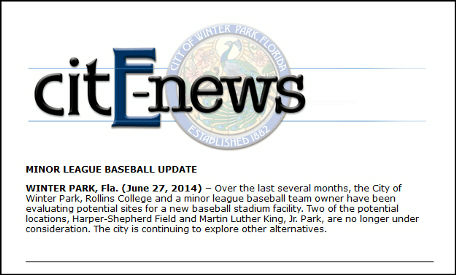
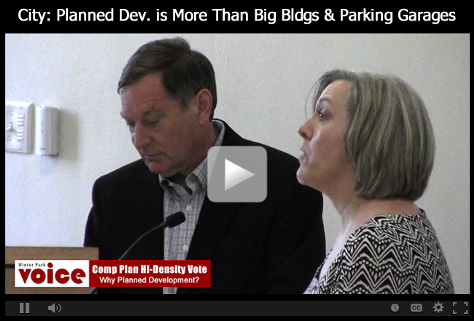
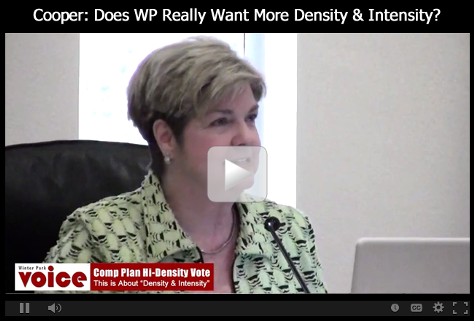
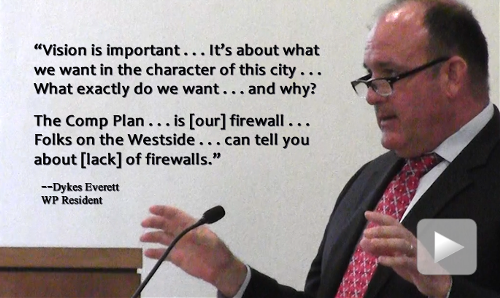
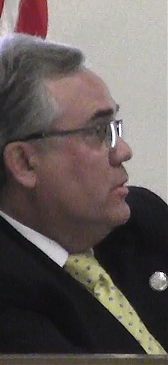
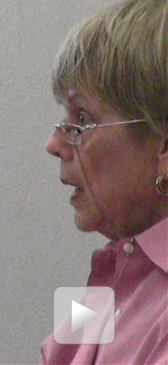
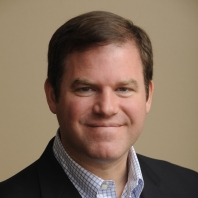
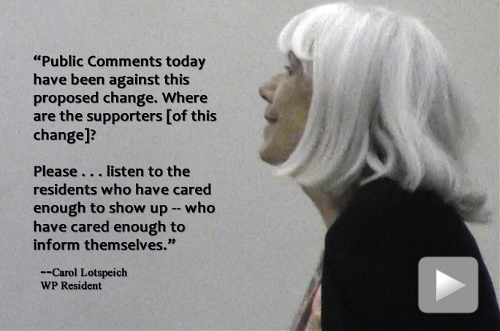
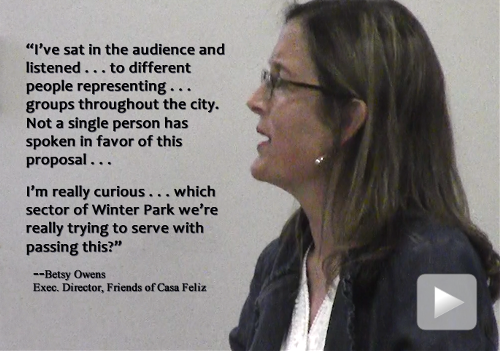
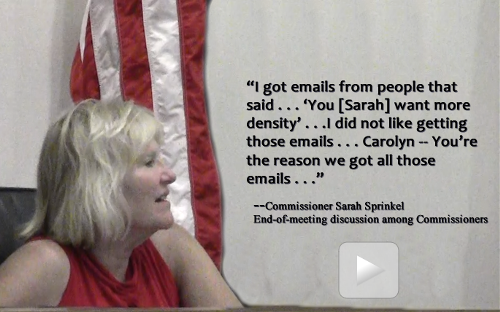
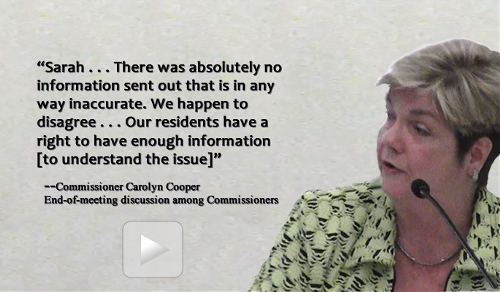
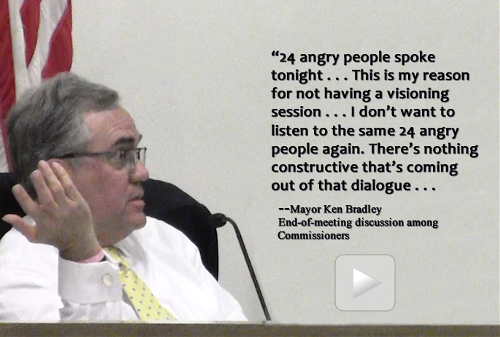
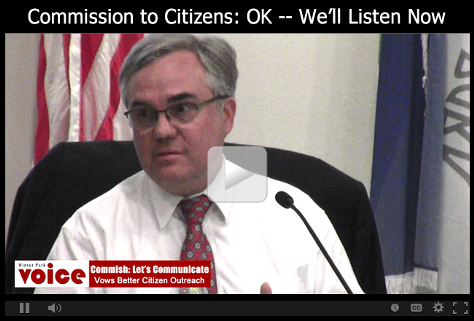
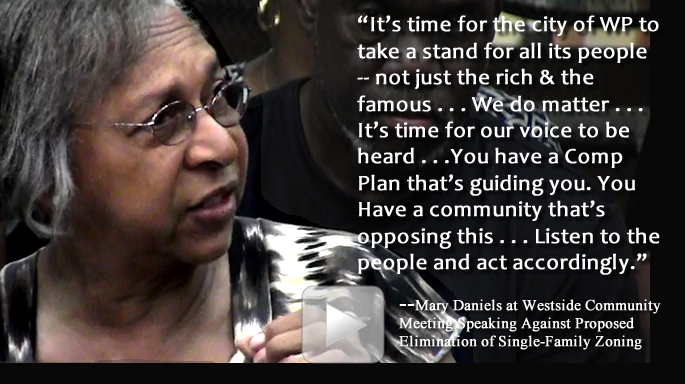
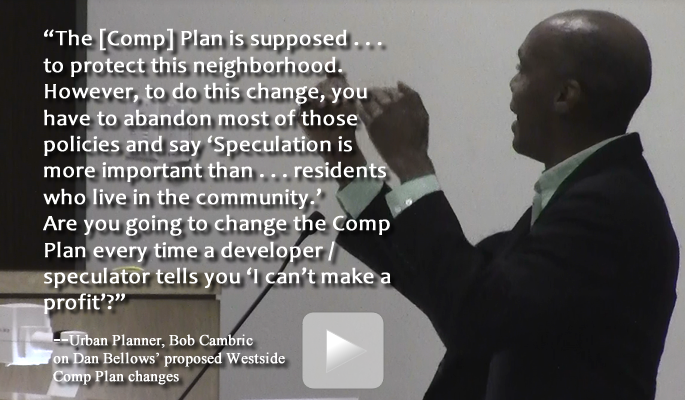
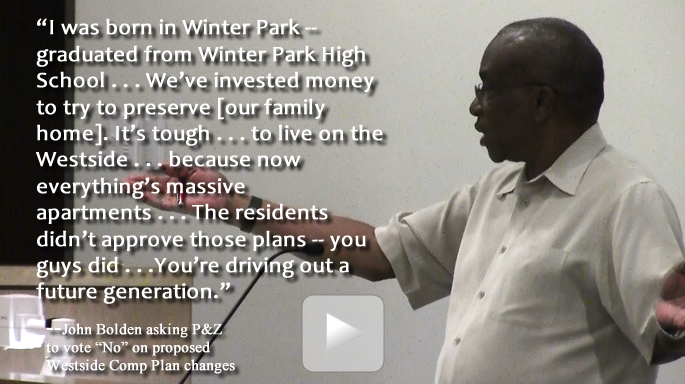
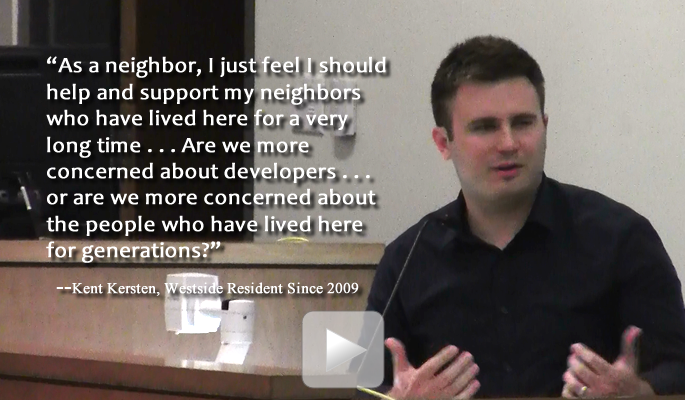
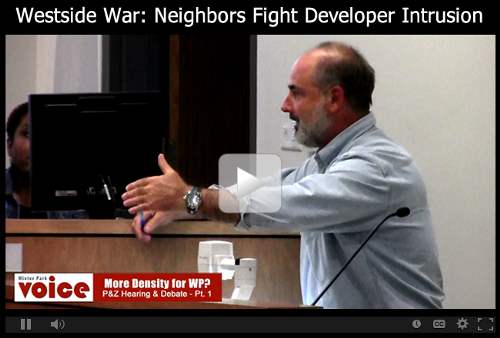
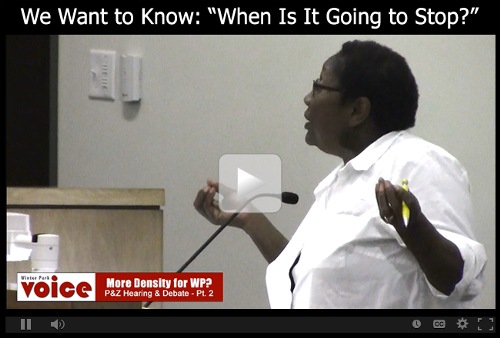
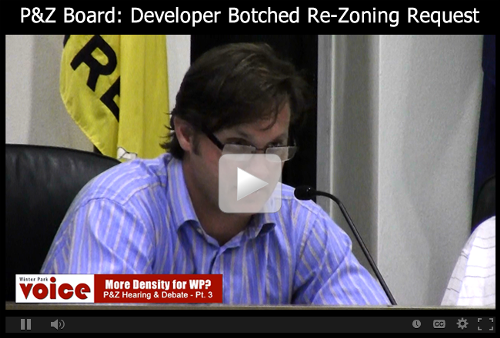
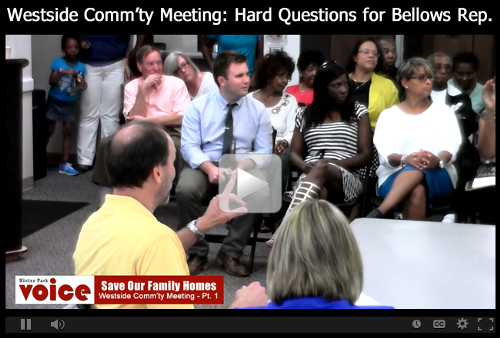
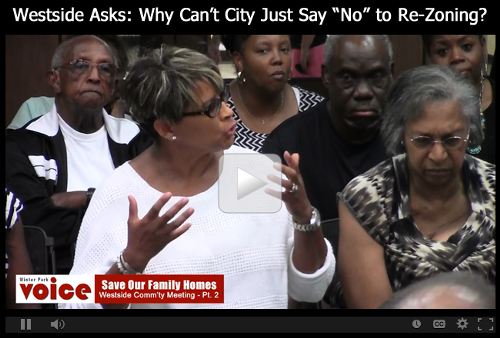
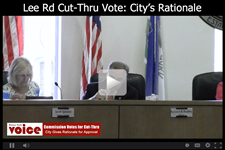
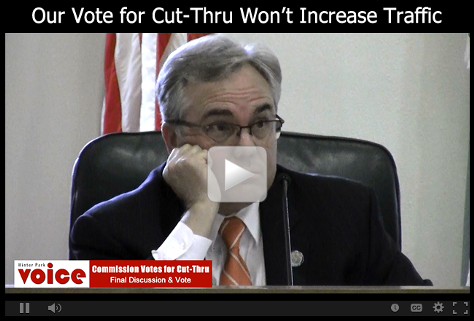
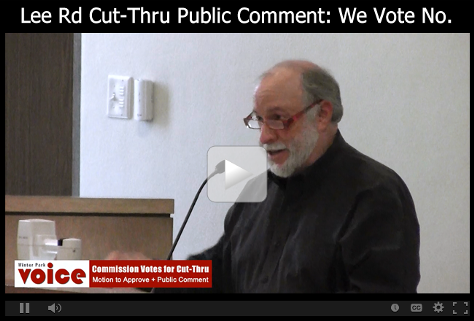
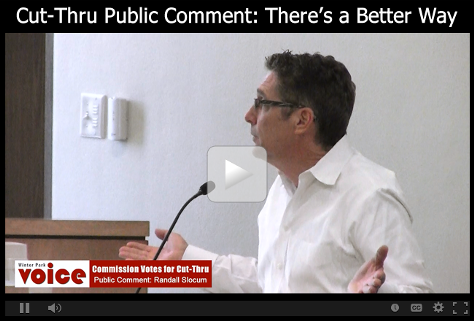
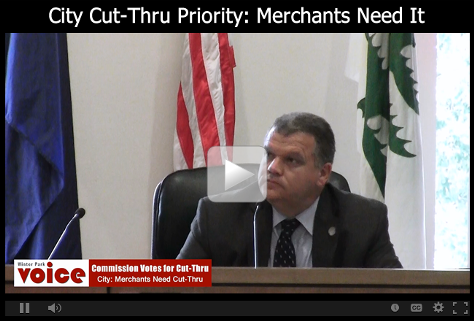

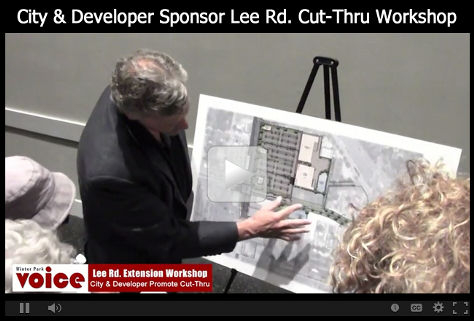
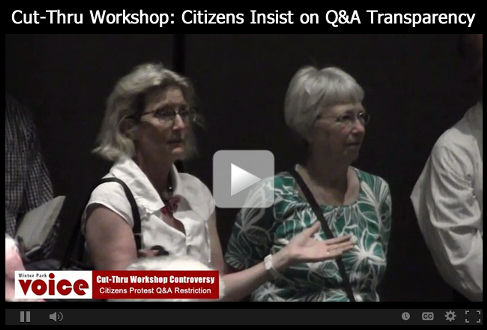
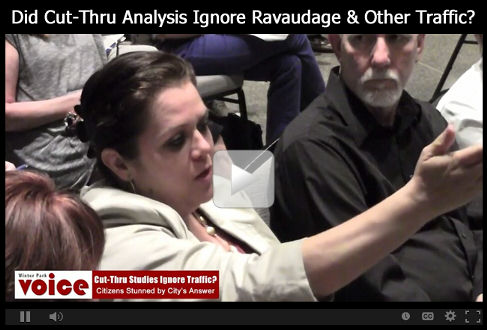
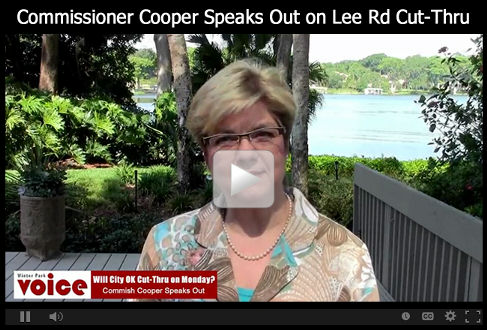
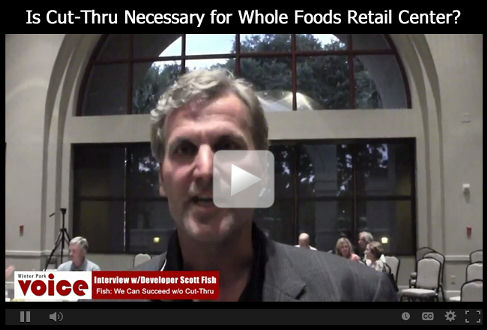
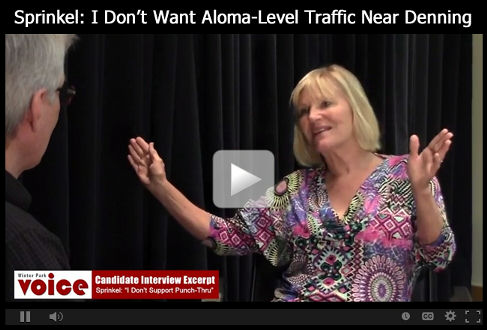
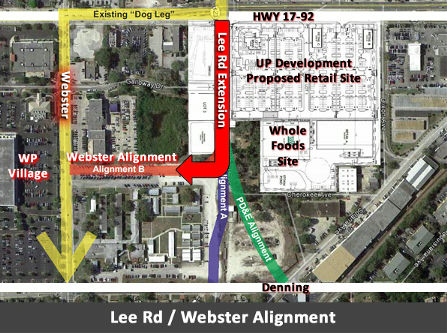 – The city was not adequately informed or prepared to make this decision at this time.
– The city was not adequately informed or prepared to make this decision at this time.
Recent Comments